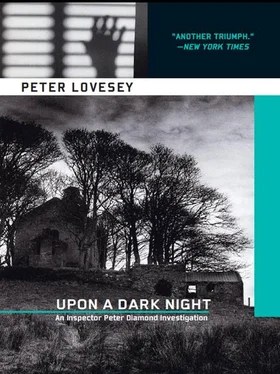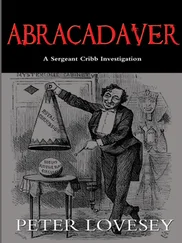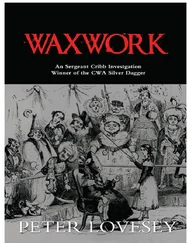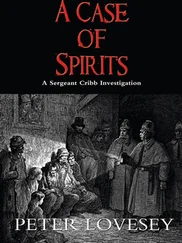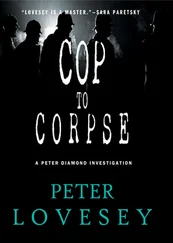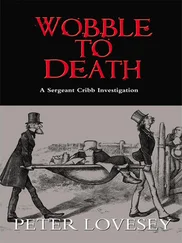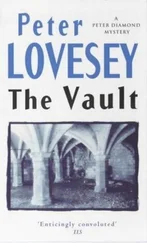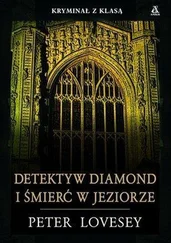‘Could be that,’ he said grudgingly. ‘But it’s the usual story. What it comes down to is that whatever the result it’s bugger-all use without a hair from the suspect to match.’
She shrugged. ‘We can hardly expect them to analyse a hair and tell us the name of the person it came from.’
He grinned. ‘Take all the fun out of the job, wouldn’t it?’
She showed him the piece in the magazine and it was as if the sun had just come out. ‘Good spotting,’ he said when he’d studied it. ‘His old dad had his fifteen minutes of fame, then. The Tormarton Seax.’
Julie said, ‘Thinking about those holes-’
‘Yes,’ he said. ‘I was thinking about them. If there was a sword buried on the site, there could have been more stuff. And someone may have done some excavating.’
‘Wouldn’t they have organised a dig in 1943 when it was found? I can’t imagine anything of interest would be left.’
‘Of value, Julie. Bugger the interest.’ He glanced at the page again. ‘Well, this was the middle of the Second World War. People had other things on their minds than Anglo-Saxon swords. I reckon archaeology took a back seat.’
‘But later, when the war ended, wouldn’t they have wanted to explore the site?’
‘Possibly. It seems nothing else was found, or it would have got mentioned here. I just don’t know. What happens if the landowner doesn’t want a bunch of university students scraping at his soil for weeks on end? By all accounts, Daniel Gladstone wasn’t the friendliest farmer in these parts. If his dad was equally obstructive, it’s quite on the cards that nobody ever followed up the find.’
‘Until just recently.’
‘Right.’
‘It could explain the digging.’
‘It could, Julie.’ He closed the magazine and tossed it back into the deed-box. ‘Do you know, I’ve thought of someone who may throw some light on this.’
Down in the reception area, the desk sergeant was under siege.
‘If you won’t let me through,’ Ada Shaftsbury told him, ‘I’ll go straight out to the car park and stand on top of his car. I know which one it is. He’ll soon come running when he looks out the window and sees his roof cave in.’
‘Mr Diamond isn’t dealing with it any more,’ the sergeant explained for the second time. ‘He’s on another case.’
‘Don’t give me that crock of shit.’
‘Madam-’
‘Ada.’
‘Ada, if you’ve got something material to say, I’ll make a note of it. There are other people waiting now.’
‘If gutso isn’t dealing with it, who is?’
‘Another officer in CID.’
‘Well, is it a secret, or something?’
‘I don’t suppose you’ve heard of him.’
‘Try me. I know everyone in this cruddy place. I spend half my life here.’
‘I know that, Ada. Chief Inspector Wigfull has taken over. ’
She grimaced. ‘Him with the big tash. God help us!’
‘Now if you’ll kindly move aside…’
‘I’ll have a word with Wigfull, then.’
‘We’ll tell him you called.’
‘You won’t. You’ll take me to see him pronto. I have important information to impart.’
At this sensitive moment the interior door opened and Peter Diamond stepped into the reception area on his way out.
‘Mr Diamond!’ Ada practically embraced him.
‘Can’t see you now, Ada. I’m on an emergency.’
‘Is it true you’re off the case?’
‘What case?’
‘The missing woman, my friend Rose.’
He said with deliberate obtuseness, ‘I’m dealing with a murder. An old man. Right?’
Ada said bitterly, ‘Nobody bloody cares. You’ve written her off, haven’t you? She’s off your list. They moved a new woman in last night. It’s like she never existed. And how about poor little Hilde?’
He crossed the floor and went through the door, leaving Ada still defiantly at the head of the queue. She would presently get upstairs to torment Wigfull, he thought with amusement. Offloading the Royal Crescent case had been a wise decision. But halfway up Manvers Street he grasped the significance of something Ada had said. If they had moved a new woman into Rose’s room at Harmer House, they must have vacuumed it and changed the bed-linen. Any chance of obtaining a sample of Rose’s hair from that source had gone. The smile vanished.

Young Gary Paternoster was alone behind the counter in the shop called the Treasure House when Diamond entered. He dropped the book he was reading and stood up guiltily. He was still wearing the suit, but a yellow tie with a palm tree design held promise that some of the previous day’s man-to-man advice had sunk in.
It was Diamond’s first experience of a detectorists’ shop. They had designed it to excite the customer with murals of gold and silver objects half submerged in sand. There was a real wooden chest open in one corner and filled with fake treasure picked out by a spotlight. But most of the space was taken up with metal detectors with their special selling-points listed. ‘Silent search’, ‘deep penetration’ and ‘accurate discrimination’ were the qualities most touted. You would need to make some major finds to justify the prices, Diamond decided. There was also a stand with books, magazines and maps.
‘Relax, Gary,’ Diamond told the quaking youth. ‘I’m not here to make an arrest. I want to tap your expert knowledge. Have you ever heard of the Tormarton Seax?’
The question took some time to make contact. Mentally, Paternoster was still in the bedroom at the Royal Crescent. ‘It’s a sword, isn’t it? In the British Museum.’
‘Right. I don’t expect you to have its history off pat. It was found in the war by a farmer up at Tormarton, north of where the motorway is now.’
‘I know,’ he said. ‘It’s a place where detectorists go.’
‘The farm?’
‘Not the farm. No one’s ever been allowed on the farm. I mean the general area. It was the border between two ancient kingdoms, Mercia and Wessex, so there were skirmishes. And there was the great battle in the sixth century.’
Where had he heard this, about Mercia and Wessex? From the vicar, explaining the derivation of Tormarton’s name. ‘What great battle?’
‘Between the Saxons and the Britons. The Saxon army was fighting its way west for years, across the Berkshire Downs and to the south as well. This was the decisive battle. Hardly anybody knows about it these days, but it was just as important to our history as Hastings. It was the one that made modern England. If you’ve got a minute, there’s a book on the stand.’
Diamond wasn’t sure how much he needed to know of sixth-century history, but he was going to get some. Young Paternoster was fired up.
‘Here it is. “As the Anglo-Saxon Chronicle tells us, in 577 Cuthwine and Ceawlin fought against the Britons and killed three kings, Conmail, Condidan and Farinmail, at the place called Dyrham, and they captured three of their cities, Gloucester, Cirencester and Bath.”’
‘At Dyrham, it says?’
‘A mile or so south-west of Tormarton, actually. “The West Saxons, under the command of their king, Ceawlin, cut the Bath to Cirencester Road, the A46, as it is now, and camped a little to the west, at Hinton Hill Fort.”’
‘Hinton, I’ve heard of.’
‘“The Britons had assembled three armies, two from the north and the other from the south, and they sensibly combined forces, but this required strenuous manoeuvres to avoid being picked off separately by the Saxons. It is likely that their fighters were exhausted and dispirited before the battle. Moreover, they made the tactical error of trying to attack the well-defended Saxon army by pushing up the hill. They suffered a massive defeat. Wessex was established in the south-west, and the Britons retreated to Cornwall and Wales.”’
Читать дальше
